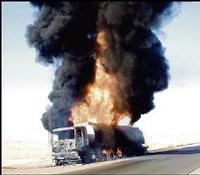
A truck carrying fuel burns after an attack by insurgents north of Baghdad yesterday. - REUTERS
BAGHDAD (Reuters):
A SUICIDE BOMBER caused carnage at a Shi'ite funeral and gunmen ambushed a vital fuel convoy outside Baghdad amid a wave of attacks that killed more than 50 people yesterday, the bloodiest day in Iraq for weeks.
Car bombs went off in the capital and in the recently peaceful Shi'ite holy city of Kerbala, suggesting a level of coordination that may be a response by Sunni Arab insurgents to last month's largely peaceful parliamentary election.
The funeral attack was the bloodiest single incident since the vote, killing 36 and wounding 40 in the town of Miqdadiya, 100 km (60 miles) northeast of the capital. The area is rapidly emerging as the most violent in the country, eclipsing the previous hotspots of Falluja and Ramadi to the west.
The victims were gathered at a cemetery to mourn a local member of the Dawa party, headed nationally by Shi'ite Islamist Prime Minister Ibrahim al-Jaafari.
Assailants fired mortars on them, forcing them to take cover amid the gravestones, before a bomber wearing an explosive vest blew himself up among them, security officials said.
FUEL TANKERS AMBUSHED
Soon afterwards, rebels armed with rocket-propelled grenades and machine guns ambushed 60 fuel tankers on a road north of Baghdad, destroying 20 of them, police and oil officials said.
"The convoy left Baiji and was on its way to Baghdad when it came under fire. So far we know 20 have been destroyed," an oil industry official said.
A group called the Islamic Army in Iraq claimed responsibility for the assault in an Internet statement, saying the convoy belonged "to the enemy occupier", a reference to the 150,000 U.S. troops stationed in the country.
The statement did not mention casualties and the Oil Ministry in Baghdad said only one tanker had been destroyed, by a bomb planted at the side of the road.
However, by nightfall, police said there were still isolated clashes on the road and at least four people had been killed -- a driver and three members of the convoy's security team.
The convoy was part of a major government effort to ease fuel shortages in the capital following the recent closure of Iraq's main refinery at Baiji in the north.
The refinery has now reopened and Iraq has begun to export oil again through its southern ports. The Oil Ministry said Iraq was shipping 1.5 million barrels per day, substantially more than the average for December, when exports slipped to a post- war low of just 1.1 million barrels.
In Baghdad's first fatal car bomb attacks of 2006, at least 13 people were killed and 27 were injured.
Five died when a vehicle detonated in the northern Shi'ite district of Kadhimiya and eight perished in a second bombing close to a busy commercial market in the southern area of Doura, police and hospital sources said.
GOVERNMENT TALKS
The violence came as Shi'ite, Sunni and Kurdish politicians pledged to plough on with efforts to form a national unity government capable of stemming the bloodshed.
While much of the violence has been in Diyala province, north of Baghdad, the southern city of Kerbala has been peaceful of late, and Wednesday's car bombing was the first in the Shi'ite holy city since December 2004.
Police said three civilians were injured.
In March 2004, coordinated suicide bombings during the annual religious festival of Ashura killed more than 90 people in Kerbala, and any attack there is likely to have had a sectarian motive.
Mistrust between Iraq's majority Shi'ite and minority Sunni Arab communities has been heightened by the results of last month's election, which some Sunni and secular leaders charge were rigged to favour the Shi'ites.
The Iraqi electoral commission has called in a panel of four international monitors to investigate those claims.
Following a series of bilateral meetings in Kurdistan, political leaders have agreed to meet in Baghdad soon to push their plan for a government capable of stemming the killings and abductions which have become part of daily life for millions of Iraqis since the U.S.-led invasion of 2003.
The latest prominent kidnap victim was the sister of Interior Minister Bayan Jabor, seized in Baghdad on Tuesday.
Iraqi security forces launched a major security operation to find her, shutting two major bridges over the River Tigris, closing parts of the city and setting up impromptu checkpoints.
The abduction came three months after Jabor's brother was kidnapped and held for one night.
Jabor, an Islamist Shi'ite, is a hate figure for Sunni Arab rebels and has strenuously denied their allegations that his ministry condones Shi'ite death squads targeting them.

